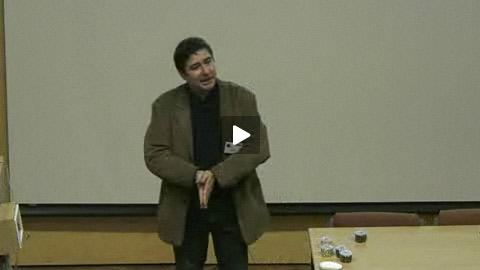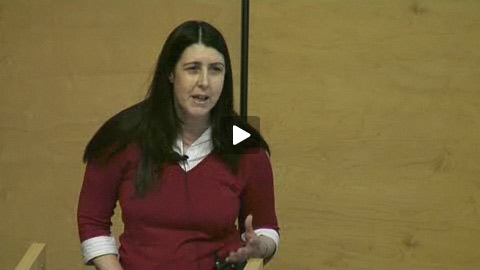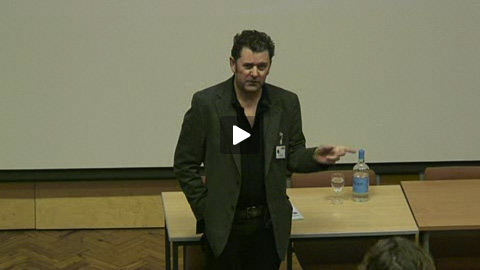E-learning symposium
Date: 25 January, 2008
Location: Avenue Campus, University of Southampton
Event type: Symposium

The third e-learning symposium organised by the Subject Centre for Languages, Linguistics and Area Studies brought together practitioners from a wide range of disciplines and institutions.
This one-day event focused on issues relating to Web 2.0 in education and engaged critically with the use of social networking technologies (wikis, blogs, and tools such as Facebook, MySpace, Elgg and Second Life) for educational purposes. Other areas addressed on the day included the role and position of the teacher within e-learning, and the development, storing, re-use and sharing of learning objects. The day provided examples of good practice and facilitate critical discussion.
Past events
This event followed on from the success of the E-Learning symposiums in December 2005 and February 2007.
| Time | Session |
|---|---|
| 09.45 - 10.15 | Registration and coffee |
| 10.15 - 11.00 | Control and constraint in e-learning Jon Dron, Athabasca University |
| 11.00 - 11.30 | Helping students develop Internet research skills for a Web 2.0 World Emma Place, Institute for Learning and Research Technology (ILRT), University of Bristol |
| 11.30 - 12.00 | Coffee |
| 12.00 - 12.45 | Wikis and social software: using open content to promote collaborative learning Steve Wheeler, University of Plymouth |
| 12.45 - 13.45 | Lunch |
| 13.45 - 15.15 | Each workshop will last for 45 minutes and will then be repeated. |
| Workshop 1. Introducing Learning Object Creator: a tool for creating your own e-learning materials Alison Dickens, University of Southampton; David Donnarumma, Brunel University; Carole MacDiarmid, University of Glasgow Sample Learning Objects |
|
| Workshop 2. Crossing cultures and MUVEing worlds: exploring aspects of cultural identity in Second Life (SL) Julie Watson and Ann Jeffrey, University of Southampton |
|
| 15.15 - 15.45 | Tea |
| 15.45 - 16.30 | Learning Tools for the Web Literate Generation Dave Millard, University of Southampton |
Abstracts
Control and constraint in e-learning
Jon Dron, Athabasca University
Being in control of one's own learning nearly always entails delegating some control to others, such as teachers, friends, colleagues, authors and directors. But control is a relative thing: our learning trajectories are constantly buffeted and corralled by an assortment of extrinsic and intrinsic constraints, from our own knowledge, to the schedules of courses, to the demands of the subject matter, to the laws of physics. The tools and environments of e-learning are part of that fabric of constraint, each with their own particular pattern of affordances, limitations, implicit learning & teaching models and emphases. As a consequence, while e-learning tools and environments can be powerful learning allies, that power often comes with a loss of control for both learners and teachers. In this talk I will discuss how social software for education, in which not just the members of the crowd but the crowd itself plays a role in guiding our learning, might radically change this learning landscape. It has the potential to let the learner choose when to choose: to give autonomy when autonomy is desired, but to provide a helping hand when it is needed, with the learner firmly in control. In this new ecology the teacher becomes, not a sage on the stage nor even a guide on the side, but a fellow traveller on the learning journey. The current generation of social software only partially fulfils that promise so I will be presenting ideas, models and methods that get us closer to the ideal.
Helping students develop Internet research skills for a Web 2.0 World
Emma Place, Institute for Learning and Research Technology (ILRT), University of Bristol
Intute [1] is a free online service from JISC created by university subject specialists, with over 120,000 links to academic content on the Web, as well as a suite of Internet training tutorials for university students [2].
Staff who run the service have recently, by necessity, been debating the opportunities and threats presented to the academic community by new Web technologies.
Web 2.0 makes it easier for everyone to publish online using tools such as blogs, wikis and social networking sites. In many ways this is liberating and has generated some interesting examples of new ways of conducting learning and research. But the producer/consumer model of Web 2.0 also means a plethora of self-published material online, placing much more onus on the user to develop the skills and judgment required to identify appropriate sources for education and research.
Students may well be savvy when it comes to using new Web technologies when they arrive at university, but it might be a mistake to assume they have developed the Internet research skills required for academic work.
Do any of these statements describe your students?
- They rely too heavily on Internet searches for their research and ignore other key sources of material
- They don’t critically evaluate the information they find online and degrade the quality of their work by citing inappropriate resources
- They copy information from the Internet and don’t acknowledge their sources
Few of the QAA Subject benchmark statements [3] for UK degree courses currently explicitly include "Internet research skills" but perhaps they should? Perhaps we should formally teach our students how to maximise their use of the Internet for academic work? There is evidence of some academics and librarians actively doing this, and this session will look at some of these approaches with a view to sharing and promoting good practice.
- Intute
www.intute.ac.uk - Intute Virtual Training Suite
www.vts.intute.ac.uk/ - QAA Subject benchmark statements
www.qaa.ac.uk/academicinfrastructure/benchmark/
Wikis and social software: using open content to promote collaborative learning
Steve Wheeler, Faculty of Education, University of Plymouth
Web 2.0 applications are increasingly used in a number of formal education contexts to promote collaborative learning. The wiki is open architecture software that offers a particularly useful set of flexible and collaborative features. Wikis are quick and easy to set up and can be used to deliver course content, to promote engaging social learning activities, and to facilitate topic focused discussions. The University of Plymouth, has used wikis for the past two years to address the problem of delivering the minimum core curriculum to trainee teachers who are geographically distributed, where time and location are issues.
This presentation outlines the problems, describes the use of the wiki as a means of delivering engaging content and activities, and evaluates its potential to facilitate collaborative learning. Current student teacher groups (n=200) regularly use the wiki as an integral part of their blended learning experience. Results from a series of online discussions, surveys, page editing and post-experience questionnaires reveal that most students enjoy using wikis as a part of their learning, although many are also reluctant to edit the other students' work. Several have reported that they refine their presentational skills when they realise that their pages are being read by a 'hidden audience'. The implications of these and other findings will be discussed, and recommendations will be made for future uses of wikis in education.
Learning Tools for the Web Literate Generation
Dave Millard, University of Southampton
In recent years we have seen a new trend emerging: users taking ownership of the information systems that they use, creating an individual mix of applications and systems that both forms their digital identity and shapes their virtual experience. This New Web Literacy is the driving force behind Personalised Learning Environments (PLEs) in the e-learning domain, and has resulted in increased practitioner experimentation with Web 2.0 applications - such as Wikis, Blogs and Social Tools.
Recognising that student expectations are shaped by their web literacy could result in a new generation of learning tools that would respect learner autonomy without disempowering institutions. In this talk I explore the notion of Web Literacy, describe what these new tools might look like, and present a number of tools currently being created within the Learning Societies Lab at Southampton that could help us reclaim the term Virtual Learning Environment (VLE) from today's monolithic systems.
Workshops
Each workshop will last for 45 minutes and will then be repeated.
Workshop 1: Introducing Learning Object Creator: a tool for creating your own e-learning materials
Alison Dickens, University of Southampton; David Donnarumma, Brunel University; Carole MacDiarmid, University of Glasgow
This workshop will introduce the Learning Object Creator tool that has been developed by the Subject Centre in collaboration with colleagues from the University of Southampton. The tool is an easy-to-use piece of software that provides a pedagogic template for the creation of learning activities (learning objects) that can then be used in a VLE or on a website to support online or blended learning. The workshop will present the tool and showcase some of the materials that have been developed during a pilot project that is due to complete in March 2008. The pilot project has involved teachers from a variety of disciplines and institutions, two of whom will be present to talk about their experiences of using the tool and to demonstrate the materials they have produced so far. There will be an opportunity for participants to explore the tool and the learning objects from this project. The Subject Centre is planning to run a full-day workshop on the use of the tool after the end of the pilot project.
Workshop 2: Crossing cultures and MUVEing worlds: exploring aspects of cultural identity in Second Life (SL)
Julie Watson and Ann Jeffrey, University of Southampton
MUVEs such as Second Life (SL) offer an opportunity to explore the potential of 3D virtual worlds for a variety of educational purposes. Cardenio, a SL project funded by the Higher Education Academy Subject Centre for Languages, Linguistics and Area Studies brought together a number of curious modern language teachers from the University of Southampton and some established SL residents to form a small exploratory in-world community. They set out to investigate the intercultural experience through areas of culture, identity, community and belonging in an environment developed outside the traditional boundaries of formal education system. This workshop will outline some of the educational work that is being conducted in SL as well as present the Cardenio project and its findings.



